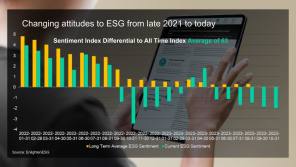

With the changes to many aspects of our lives experienced in 2020 and the changes yet to come as a result of the fear caused by Covid-19, the launch of a fund called Future World rather caught my eye.
The range was first announced in 2018 and this fund launched in February 2020.
The name of the fund really taps into people’s emotions and aspirations, but at the same time, it reminded me of Tomorrow’s World and how its forecasts of the future were often misguided or unrealistic.
So what does a future world fund do and invest in?
First off, the Legal & General Investment Management fund does not focus on technology, but environmental, social and governance investments.
That said, many of the top 10 holdings look very similar to that of a technology fund.
Given the ESG factors of this index and the characteristics of many tech companies, that is not too surprising.
LGIM has worked with German index specialist Solactive to create a benchmark based on L&G’s Future World Protection List.
This list excludes companies that have a negative impact on the environment and are considered anti-social.
It specifically excludes ‘pure’ coal miners and businesses that profit from controversial weapons.
The index also excludes some companies that do not comply with UN Global Compact Screening criteria.
This is the first screen LGIM and Solactive use to filter their universe.
LGIM has also created an ESG scoring system, which prioritises factors Legal & General considers most important to long-term investors.
It helps it to identify which companies have superior ESG credentials.
The group also factors in other aspects such as transparency and quality of the ESG data.
This tilts the index to reduce exposure to companies with poor ESG credentials in favour of those that score well.
A large part of ESG investing is about active engagement with companies, so it may seem strange for a fund manager with a strong passive reputation to get involved.
But LGIM as a passive investor sees itself as a long-term owner of the businesses (on behalf of investors).
It can add value by active engagement with the companies in its funds and ESG has become an increasingly important part of this process.
Legal & General has the scale to influence company boards and these passive solutions will only add to the momentum behind ESG.
Overall this is an interesting proposition and as ESG becomes more important, advisers and their clients are going to demand similar solutions from both active and passive fund managers.
Adrian Lowcock is head of personal investing at Willis Owen



